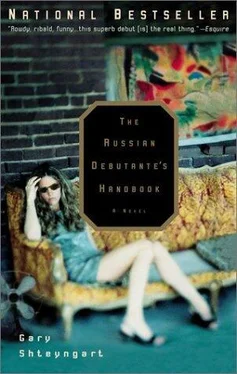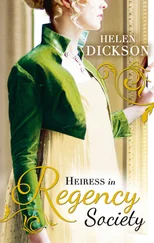Gary Shteyngart - The Russian Debutante's Handbook
Здесь есть возможность читать онлайн «Gary Shteyngart - The Russian Debutante's Handbook» весь текст электронной книги совершенно бесплатно (целиком полную версию без сокращений). В некоторых случаях можно слушать аудио, скачать через торрент в формате fb2 и присутствует краткое содержание. Город: New York, Год выпуска: 2003, ISBN: 2003, Издательство: Riverhead Books, Жанр: Современная проза, Юмористическая проза, на английском языке. Описание произведения, (предисловие) а так же отзывы посетителей доступны на портале библиотеки ЛибКат.
- Название:The Russian Debutante's Handbook
- Автор:
- Издательство:Riverhead Books
- Жанр:
- Год:2003
- Город:New York
- ISBN:0-7865-4177-6
- Рейтинг книги:4 / 5. Голосов: 1
-
Избранное:Добавить в избранное
- Отзывы:
-
Ваша оценка:
- 80
- 1
- 2
- 3
- 4
- 5
The Russian Debutante's Handbook: краткое содержание, описание и аннотация
Предлагаем к чтению аннотацию, описание, краткое содержание или предисловие (зависит от того, что написал сам автор книги «The Russian Debutante's Handbook»). Если вы не нашли необходимую информацию о книге — напишите в комментариях, мы постараемся отыскать её.
and
. The Russian Debutante’s Handbook Bursting with wit, humor, and rare insight,
is both a highly imaginative romp and a serious exploration of what it means to be an immigrant in America.
The Russian Debutante's Handbook — читать онлайн бесплатно полную книгу (весь текст) целиком
Ниже представлен текст книги, разбитый по страницам. Система сохранения места последней прочитанной страницы, позволяет с удобством читать онлайн бесплатно книгу «The Russian Debutante's Handbook», без необходимости каждый раз заново искать на чём Вы остановились. Поставьте закладку, и сможете в любой момент перейти на страницу, на которой закончили чтение.
Интервал:
Закладка:
“Well, as soon as the war ended, you see, the Soviets built the world’s tallest statue of Stalin over Prava. It was really something. The entire Old Town was just sandwiched between Stalin’s two feet; it’s amazing he didn’t step on it.” Kostya rewarded his own joke with a little laughter. How he relished speaking to Vladimir! It was obvious to the latter that had Kostya been born in a saner time, a different country, he could easily have been a beloved schoolteacher in some gentle, slow-witted province.
“Then, after the Great One passed on,” Kostya continued, regaining his official didactic tone, “the Stolovans were allowed to blow off his head and replace it with Khrushchev’s, which, I’m sure was a great consolation. Finally, two years after the Gabardine Revolution, the Stolovans managed to dynamite most of Nikita, but… Well, don’t ask me exactly what happened… Suffice to say, the fellows who won the Left Foot contract were last seen in St. Bart’s with Trata Poshlaya. Remember her? She was in Come Home, Rifleman Misha, and, oh, what was the one set in Yalta? My Albatross. ”
“PravaInvest could dynamite the Foot,” Vladimir volunteered, momentarily forgetting his corporation’s unbearable lightness of being.
“It’s very costly,” Kostya cautioned him. “The Foot is right at the base of the Old Town. If you don’t use the explosives just right, you’ll blow half the city into the Tavlata.”
If PravaInvest couldn’t do it, then Vladimir vowed to mentally erase the Foot from his line of sight, even as it imposed its galosh-like shadow over the architectural grace of the cityscape.
Yes, giant foot aside, Prava continued to do its golden act beneath him, and then it dawned on Vladimir that this Prava was not without its charm; that while it was no Weltstadt like, say, Berlin, it was no shitty Bucharest either. Consequently, what if the Americans here were more the sophisticated Fran-and-Tyson variety than the deluded Baobab kind? Vladimir’s stomach grumbled with worry. Kostya, as if he had sensed Vladimir’s concerns, said: “A pretty town, yes? But New York must be still more beautiful.”
“Are you joking?” Vladimir said. They skipped a series of red lights and careened onto the tram rails of a bridge connecting the two parts of the city. Sparks flew and their driver cursed the Stolovans once more for their bloody infrastructure.
“Well,” said Kostya, ever the diplomat, “but New York must be bigger.”
“That’s right,” Vladimir said. “It’s the biggest.” But he was not reassured.
They swerved off the embankment and into a street lined with stately Baroque dwellings in various stages of disrepair yet still wearing their ornamentation, their gables and coats of arms standing out like the flounces on a worn Hapsburg gown.
“Stop here,” Kostya said. The driver slammed into the nearest stretch of sidewalk.
Outside, Vladimir did a little dance of happiness, a sort of cross between the jitterbug and the kazachok, feeling he could trust Kostya with this momentary lapse of reason. The Russian smiled sympathetically and said, “Yes, it’s a beautiful day.”
They found a café, one of the many from which white plastic tables reached out to the sidewalk, the tables covered with pork, dumplings, beer, and surrounded by Germans. Indeed, there were tourists everywhere. The Germans formed entire phalanxes of cheerful, drunk Swabians and purposefully striding Frankfurters. Teams of dazed Munich grandmothers on church trips staggered out of pubs to trample the yapping dachshunds being walked by their angry Stolovan counterparts: the babushka s. Upon first sight of them, Vladimir felt a kinship with these wizened survivors of both fascism and communism, whose city was clearly no longer their own, and who stared contemptuously from inside their meager headscarves at their bejeweled neighbors from across the border. He could easily picture his own grandmother in their place, except she would never consent to owning a hungry dog, preferring instead to feed her son extra portions.
But the Germans, although ubiquitous, were not alone. Clusters of stylish young Italians glided down the boulevard, trailing Dunhill smoke in their wake. A knot of Frenchwomen with identical buzz-cuts stood before a café menu, eyeing it skeptically. And finally Vladimir heard the sing-along of an American family, large and solid, arguing over whose turn it was to carry the goddamn video camera. “But where are the young Americans?” he said to Kostya.
“The young ones don’t take the tourist route too often. Although you do see them on the Emanuel Bridge, singing and begging for money.”
“We don’t want the basket cases,” Vladimir said.
“Well, I do know of a popular expatriate café for you,” Kostya said, “but first we should celebrate your arrival with a drink. Yes?”
Yes. They picked up the drinks menu. “My God,” Vladimir said, “fifteen crowns for a cognac.”
Kostya explained to him how that amounted to fifty cents.
A dollar was thirty crowns? Two drinks for a dollar? “Yes, of course,” said Vladimir Girshkin, the all-knowing international businessman. “Allow me to treat you,” he added magnanimously. And he took it further, thinking: at an allowance of two thousand dollars a week, he could budget four thousand drinks for himself. Of course, he couldn’t get too greedy, he would have to buy a lot of people a lot of booze, and then there were taxis and dinners and whatnot, but still, five hundred drinks a week was not such an unreasonable figure.
A waiter, his face as droopy as a dachshund’s, wearing the familiar oversized purple jacket and a Prussian mustache, dragged himself over to their table. “Dobry den’,” he said. It was the same greeting as in Russian, Vladimir noted cheerfully. But then Kostya said a mouthful of words that only vaguely resembled the Russian version of “Can we have two cognacs, please.”
They drank. A group of Italian schoolgirls marched down the street, waving some sort of crowing-rooster puppets at them. A pair of the bronze nymphs took their time passing by Kostya and Vladimir’s table, looking at each of them in turn with their great round eyes two shades darker than the cognac. The embarrassed Russians quickly turned away to face each other, then snuck furtive glances as the Italian girls rounded the corner. “So you said you had a relationship with an extraordinary American woman in New York,” Kostya said, his voice atremble.
“Several women,” Vladimir said nonchalantly. “But one was better than the others, as I suppose is always the case.”
“True,” said Kostya. “It has always been my dream to go to New York and find the nicest woman there and to live with her in a big house on the outskirts of town.”
“It’s always best to live in the center,” Vladimir corrected him, “and the nicest woman is hardly the most interesting. It’s a question of balance, don’t you think?”
“Yes,” Kostya said, “but for children it’s best to find someone nice, and to hell with the rest.”
“Children?” Vladimir said and laughed.
“Sure, I’ll be twenty-eight next spring,” Kostya said. “Look,” he bent his head forward and pulled at the gray hairs clumped together at the center of his crown. “Now, of course, I would like a woman who will go with me to the symphony and the museum, and, if she insists, to the ballet. And she should be well-read, too, and like children, of course. And be able to keep house, for I’d like a big house, as I’ve said. But this is not too much to expect from a beautiful American woman such as the one you described, I don’t think.”
Vladimir smiled politely. He raised two fingers to the passing waiter and pointed at their empty glasses. “So have you anyone in Petersburg?” he said.
Читать дальшеИнтервал:
Закладка:
Похожие книги на «The Russian Debutante's Handbook»
Представляем Вашему вниманию похожие книги на «The Russian Debutante's Handbook» списком для выбора. Мы отобрали схожую по названию и смыслу литературу в надежде предоставить читателям больше вариантов отыскать новые, интересные, ещё непрочитанные произведения.
Обсуждение, отзывы о книге «The Russian Debutante's Handbook» и просто собственные мнения читателей. Оставьте ваши комментарии, напишите, что Вы думаете о произведении, его смысле или главных героях. Укажите что конкретно понравилось, а что нет, и почему Вы так считаете.












